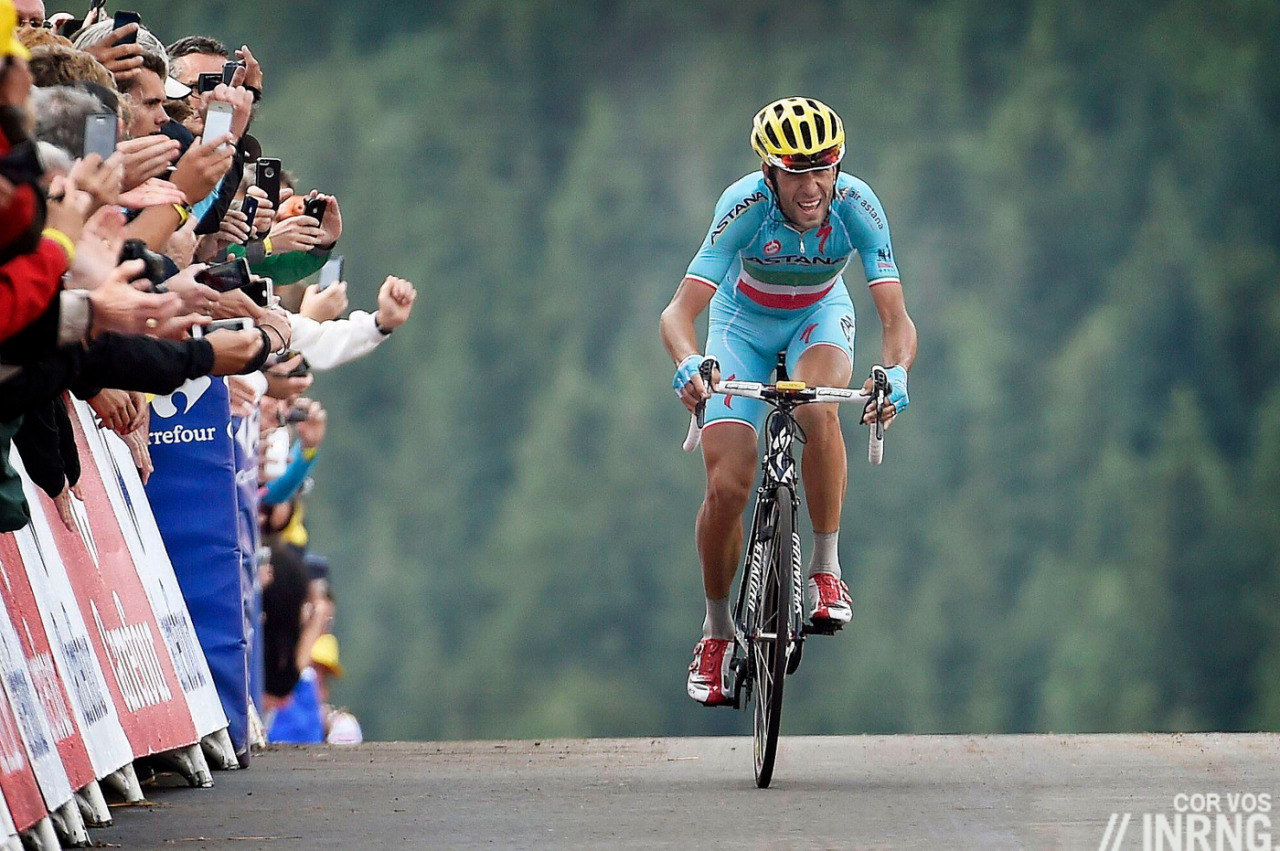
Stage 10 and Vincenzo Nibali wins atop the Planche des Belles Filles. It was one of only two days when he wasn’t wearing the yellow jersey but he reclaimed the race lead with a performance so strong that doubts about his form in the mountains were crushed.
The opening weekend will be remembered for the giant crowds, the royal reception, Marcel Kittel’s wins and Mark Cavendish’s crash. So many people turned out to see the race that the crowds were as much a topic of conversation as the race itself, whether the sheer wonder at the numbers as well as concerns over safety and selfies.
Nibali took the lead on the second day thanks to a late attack. Did he really want the yellow jersey so early? Yes but it was clever move for the stage win rather than a bid to win the Tour outright.
The Planche des Belles Filles was a decisive point because Nibali was able to drop his rivals à la pédale. He stood up and rode away, one man alone and in command. But if it was the most instructive stage, it wasn’t the most important for Nibali’s winning margin.
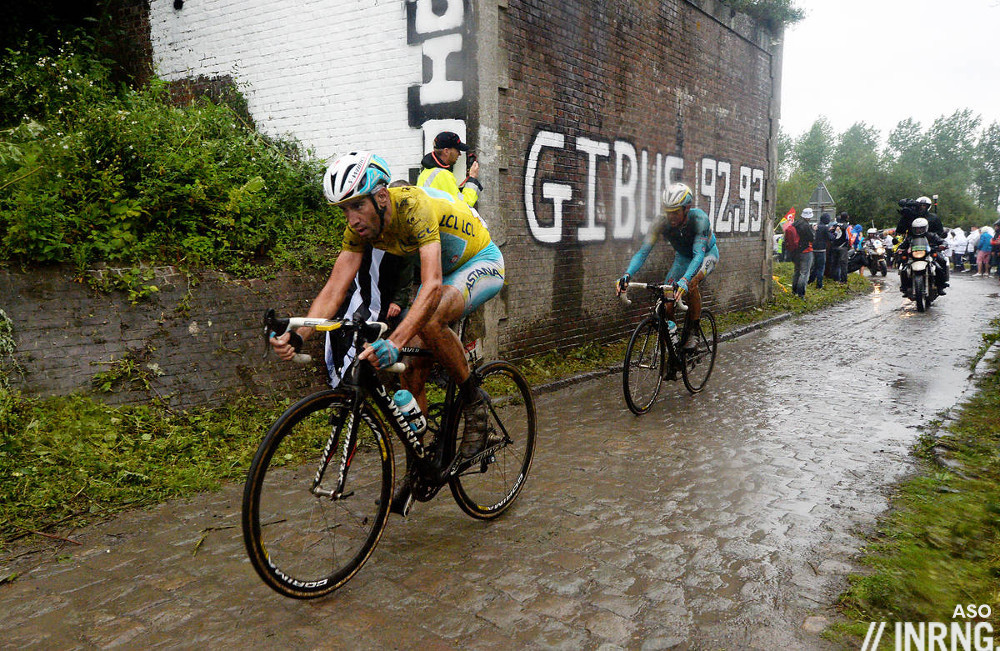
Where the race was won

The chart above shows where Nibali took time on the other podium pretenders throughout the race. He never lost a second to them, instead he regularly took time on all off his rivals throughout the race. The chart shows the most selective moment of the race was Stage 5 and the cobbles, Péraud’s big loss came from puncture. You can see Valverde’s slide in the last week depicted by the long bars.
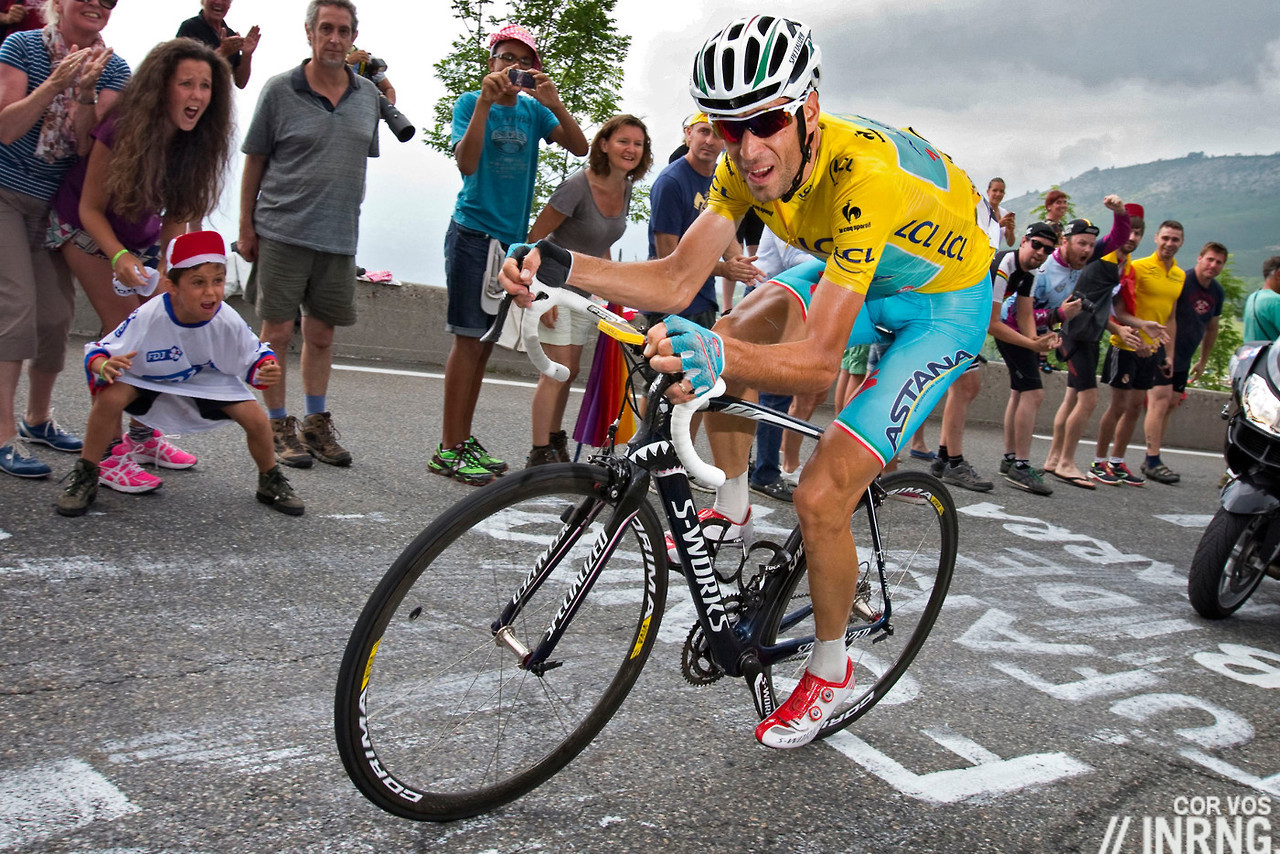
But this wasn’t a race that needed too much analysis. Compared to the last two years and Team Sky’s methodology, Vincenzo Nibali seems more a romantic. Such is the image but but behind it lies a lot of work. He might have mocked Chris Froome’s use of a power meter with a quick quip last year but he’s as much of an SRM slave in training as his rivals, with windtunnel sessions, track training and more. The difference, if there is one, is stylistic in the way he’s seen to race. Often mocked for his premature attacks – this blog asked if he was more basking shark than fierce predator – this time he wasn’t taking off with two cols to go. Instead his attacks were incisive and reserved for the end of the race. This was the same Nibali vintage as the 2013 Giro and the race highlights should be screened to juniors and beginners. Take the way he attacks, regularly crossing the road and accelerating from behind to catch his rivals by surprise. It was a win for the team but Astana weren’t dominant, come the last climb and Nibali was often down to just one rider. It left the Sicilian to operate by himself and that worked out just fine for him. And also for the race as it gave space to others to attack, there was no “mountain train” to asphyxiate rivals.
All that remains is to wonder what’s next for Nibali. He’s one of the few riders to win all three grand tours but he’s also able to win one day races. What about a revised Milan-Sanremo next year and the World Championships one year?
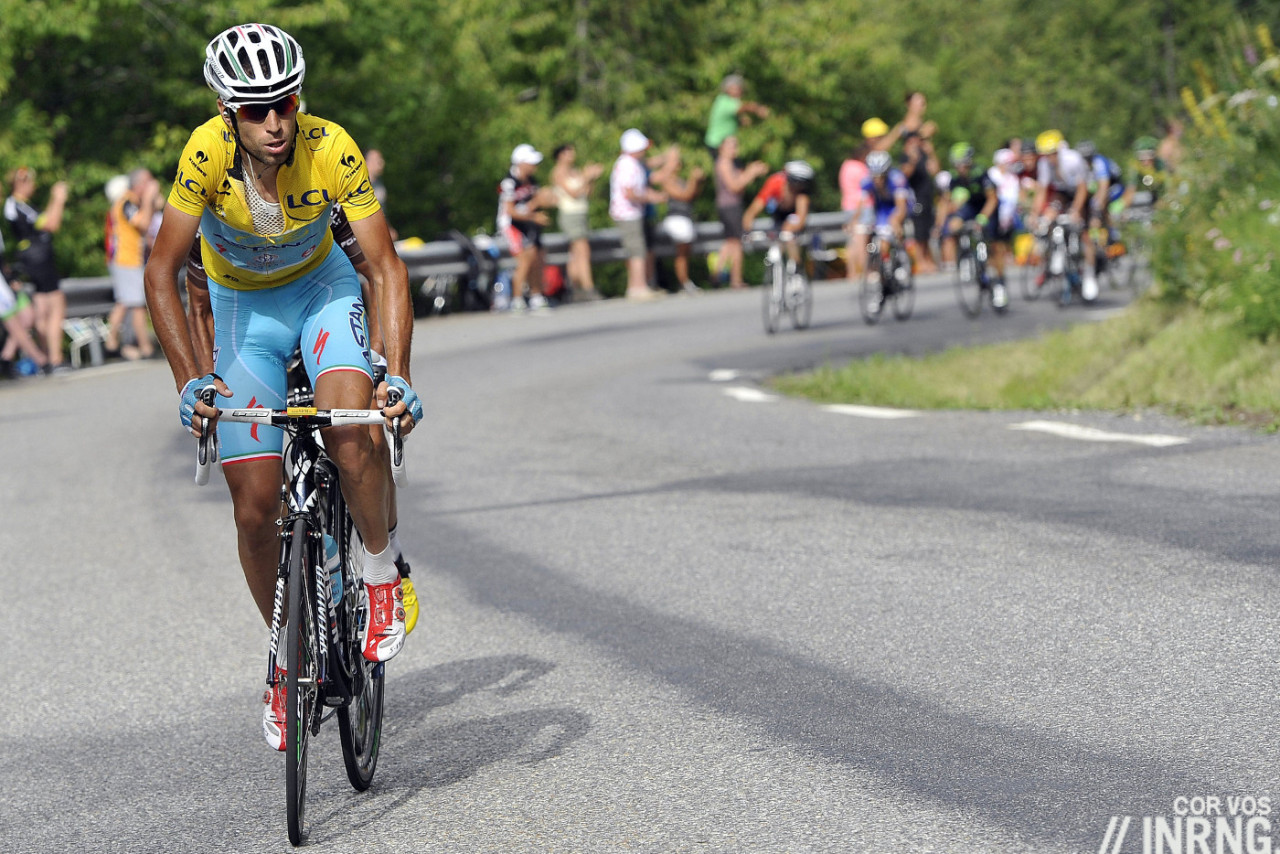
What of Jean-Christophe Péraud? It’s easy to think he’d booked a second class ticket for his journey around France and found himself upgraded to first class after the no show of Chris Froome and Alberto Contador. But he was the only rider who could at times match Vincenzo Nibali’s accelerations in the mountains: if the Italian is the Shark of Messina, Péraud was the “Remora of Lyon”. Wheelsucking on a flat road is one thing, doing on a summit finish quite another and Péraud had an outstanding tour. He also finished seventh in the final time trial. The Ag2r team was excellent with Romain Bardet finishing sixth overall and he’s still got a good margin for improvement.
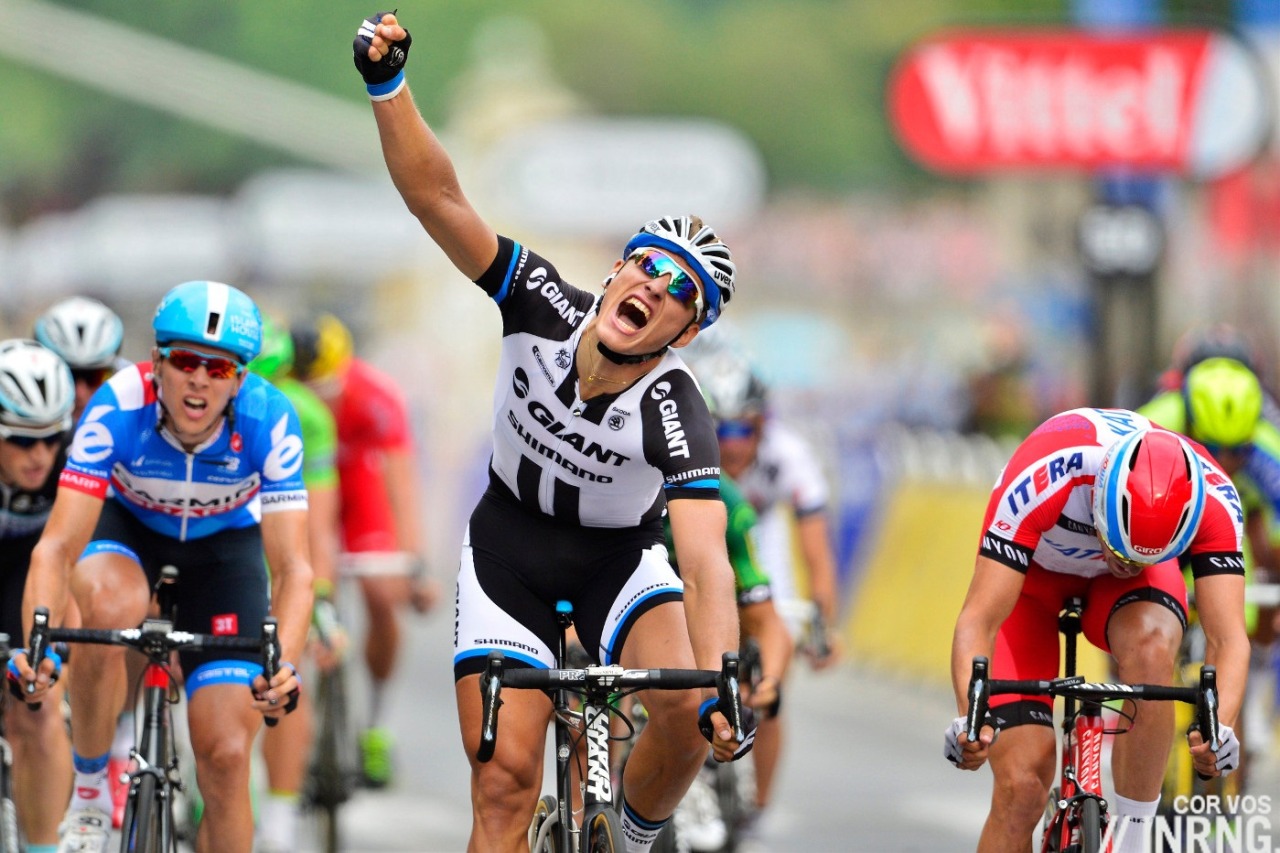
With the final stage win for Marcel Kittel, his fourth this July it marks one of the greatest ever editions of the Tour for Germany with seven stage wins… but it was a better race for the French.
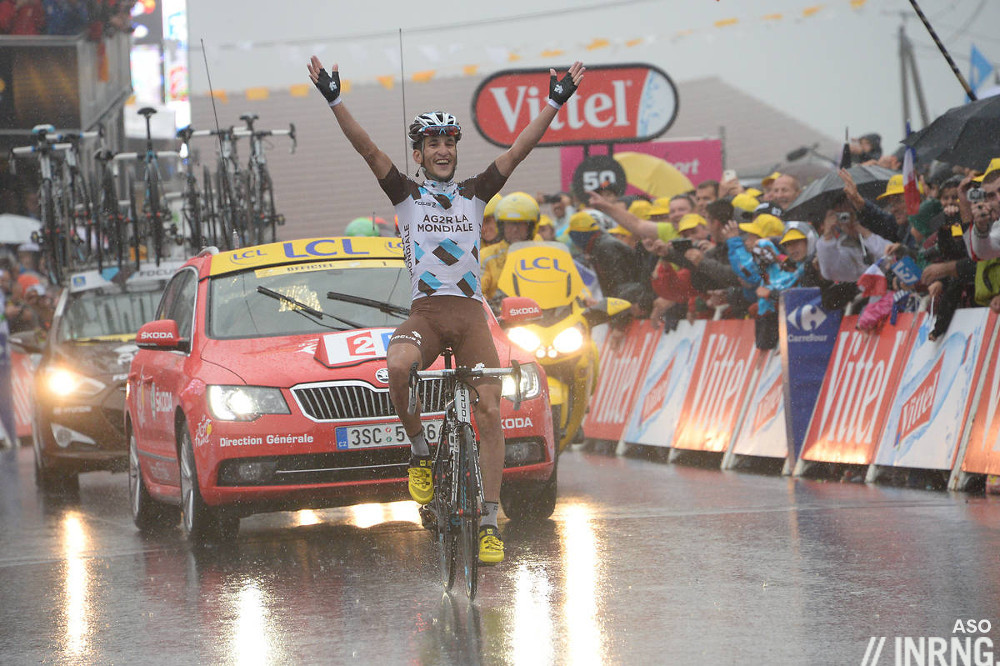
The success started with Blel Kadri’s win in Gérardmer. Or did it? There’s generational element with many crediting former national U-23 selector Bernard Bourreau and his policy of bringing on young riders, taking them to races abroad and giving a technical and tactical toolbox to start winning early and with this the confidence to continue. Borreau’s only problem was seeing his riders taken away by the pro teams, when Thibaut Pinot turned pro in 2010 he won the mountains jersey in the Tour de Romandie aged just 19. There was plenty more joy for the home crowd, think Tony Gallopin’s day in yellow plus his yellow jersey
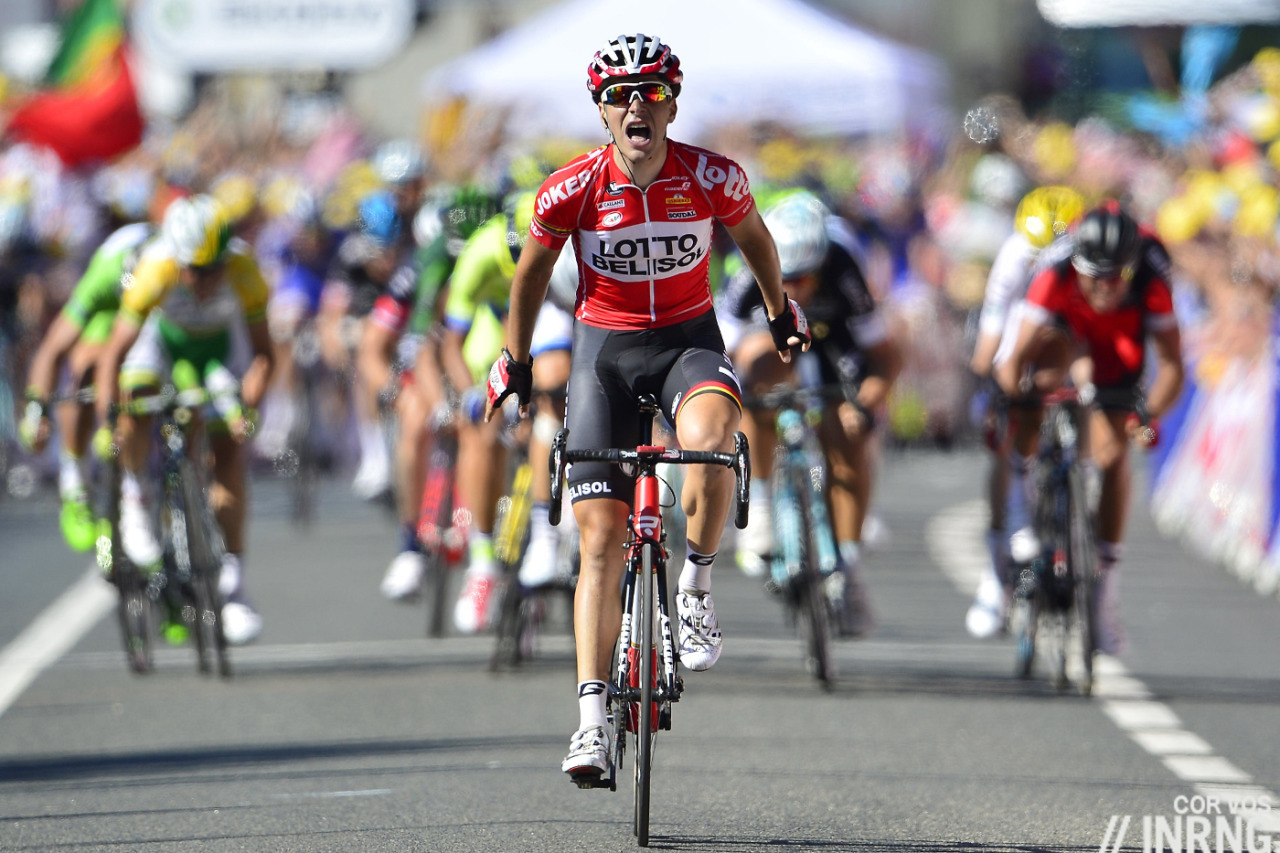
Thibaut Pinot is in a curious situation. You always want to win the race but thanks to his riding he’s now going to find himself loaded with even more pressure. Up to him to cope with it but his team are proving increasingly adept. Perhaps the solution is to “do a Rolland”, not to attack too early but to ride the Giro? Pinot loves cycling in Italy (his biggest amateur win was in Aosta, his first pro stage race win was in Lombardia and he’s even got an Italian tattoo on his arm, “solo la vittoria e bella“. Not that he needs to escape from the media, he’s a relaxed character and often enjoyable.
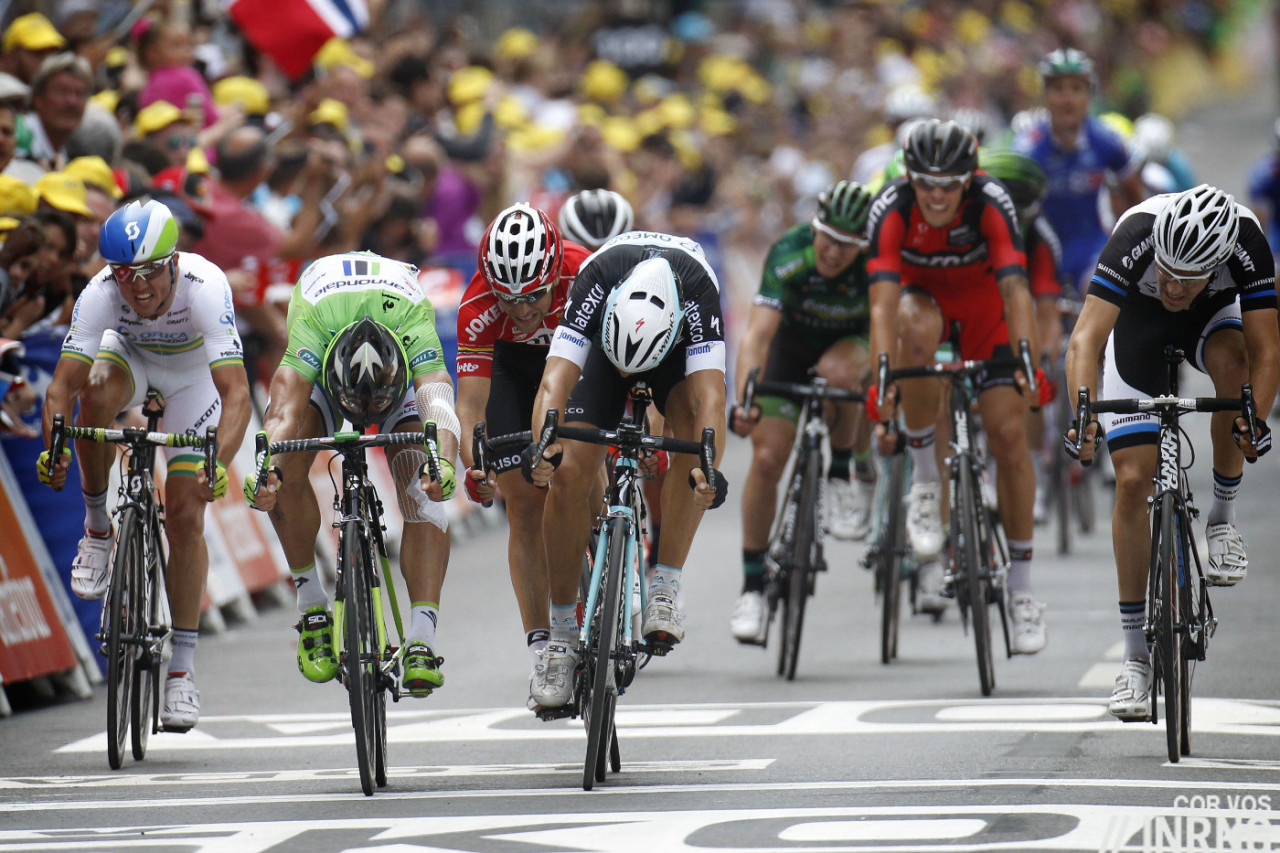
La Route du Tour
Looking back at the whole race it’s been packed with action. Even the stages where you glanced at the profile, thought “sprinters’ stage” and imagined a formulaic afternoon with events and action or if not the impressive crowds of Yorkshire and the landmarks of London. But the Tour cleverly exploited the terrain, notably with the cobbles but elsewhere too. Take Stage 7 to Nancy where the race rode into town… and then back out to use a climb to split the field before Matteo Trentin pipped Peter Sagan.
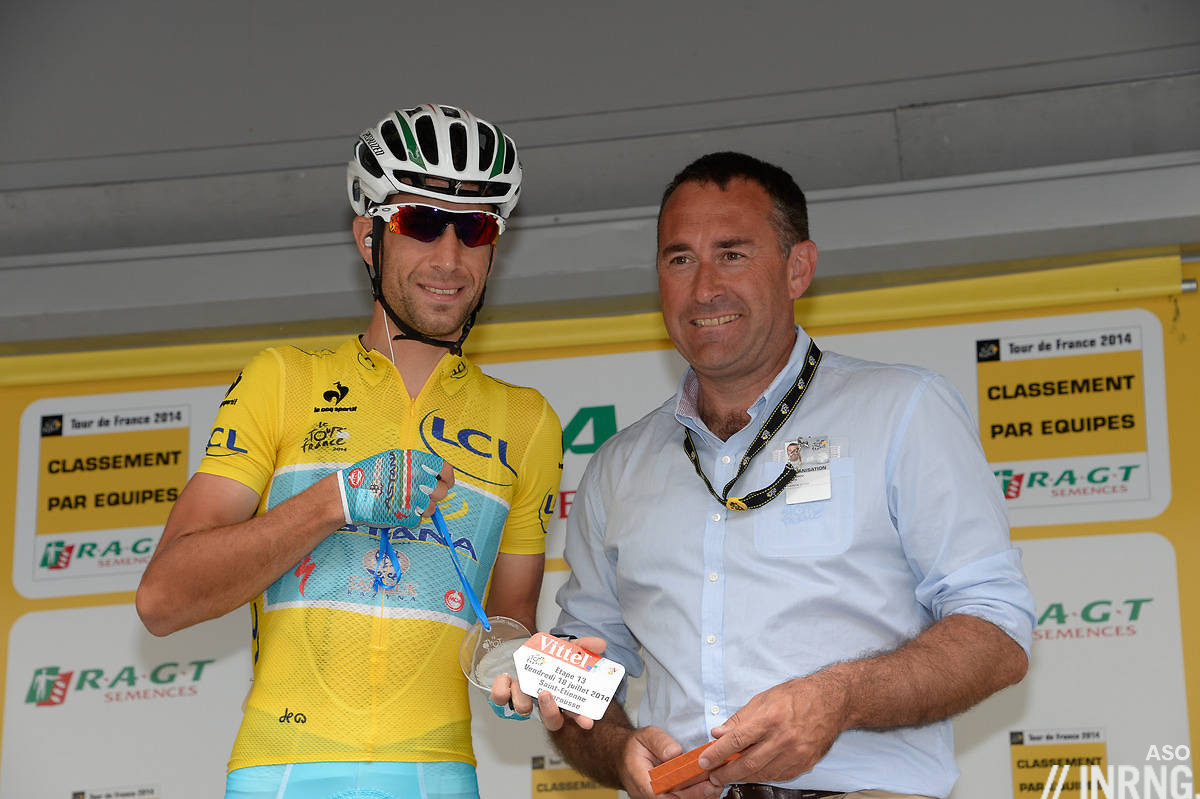
Christian Prudhomme, Thierry Gouvenou (pictured), Jean-Michel Monin and other ASO staff did a great job with the route. Also if Jean-François Pescheux has retired he’ll have helped with the work too. Traditionally the Tour would take the most obvious roads between the start and finish, the kind of route a logistics manager in a trucking company would pick. Nowadays the Tour likes to include a twist or two. Take Saturday’s time trial which detoured via a tiny road for the final climb rather than taking the main road into town. Or the day Tony Gallopin won in the Jura, a win aided by the uncategorised climb late in the race.
Worthy mentions:
- Rafał Majka for two stage wins and the mountains jersey, he rode himself into form and presumably a bonus from Oleg Tinkov
- Tony Martin for his two stage wins. The second was inevitable but the first was very special for the way he rode the whole race of his wheel
- Alessandro de Marchi wins the Combativity Prize, the jury picked him ahead of Cyril Gautier and Martin Elmiger
- Peter Sagan wins green
- Bretagne-Séché for animating the race. A modest team with a budget that’s less than Vincenzo Nibali’s income, merely starting the race was a triumph for them. They finish with nine riders
- Team NetApp-Endura were exciting for Leopold König but delivered with more riders. They’ve got a sponsor for next year and whether König stays or goes we’re likely to see them invited back next year
Dopage
Doping was never on the radar for real. All that happened (so far) was reduced to meta analysis as the media wondered if the media should be asking more questions. There were no rest day raids, no positive tests. Instead Nibali was asked several times about his ethics and to account for his team, notably the presence of Alexander Vinokourov and Guiseppe Martinelli. But it was all handled with his relaxed Sicilian (Sishilian?) accent and the context was different too, he was fortunate not to ride up a mountain faster than Lance Armstrong and the Tour de France has been a gap on a palmarès that already includes the Giro and Vuelta. Even Eugenio Capodacqua, a sort of Italian Paul Kimmage, isn’t asking too many questions.
Astana’s genesis emerged from the wreckage of the Liberty Seguros team and Operation Puerto and it’s right to question the management. But why start asking questions in July when the situation’s been known for years? The answer is because the Tour is a bigger event with a coverage that means both sections of the media and the audience alike are discovering Astana for the first time. But to those who say the sport needs to clear out team managers who doped or oversaw doping, do you want to get rid of Marc Madiot and Jonathan Vaughters? The former started FDJ as a team recruiting foreign stars where vials of EPO rattled in the back of the fridge in the team camper van while the latter admitted to personal use of EPO but both have done plenty to regenerate the sport since with the backing of supporting sponsors. The question for Astana is commercial, if the team is promoting Kazakhstan how does it communicate a story of reform and transparency? What’s good for a cycling team is helpful for the nation’s image.
Abandon – DNF
What of the fallen riders? The race will be remembered for the loss of the two top contenders. The race lost Chris Froome, the first time since 1980 that the “defending champion” had to quit the race. Days later Alberto Contador crashed out. And in their absence the race for the podium opened up only for more to fall away. Andrew Talansky showed in the Dauphiné he could have been a contender. Team Sky went from Porte Plan B to System D as they battled illness and injury and leave the race with only Mikel Nieve’s perspex Combativité prize to show, had Froome stayed in the race he might not have had much support. Katusha’s Joaquím Rodríguez must be kicking himself, the one year he uses a grand tour for training is the one year he could have shone, the route suited him too. But how much would you like to speculate? To those who say Froome or Contador would have won perhaps but there’s no certainty. What if Froome had crashed later or Contador punctured on Hautacam? Once you start fantasising about scenarios you leave behind the reality of the last three weeks.
Snap Awards
Revelation: Leopold König, previously a climber capable of winning stages races, now competent in a grand tour. Kévin Reza too.
Best team mate: Arnold Jeannesson, FDJ
Best team: Ag2r La Mondiale
Invisibility cloak: Lampre-Merida, Cofidis
Missing in Action: Haimar Zubeldia, eighth overall but did you see him?
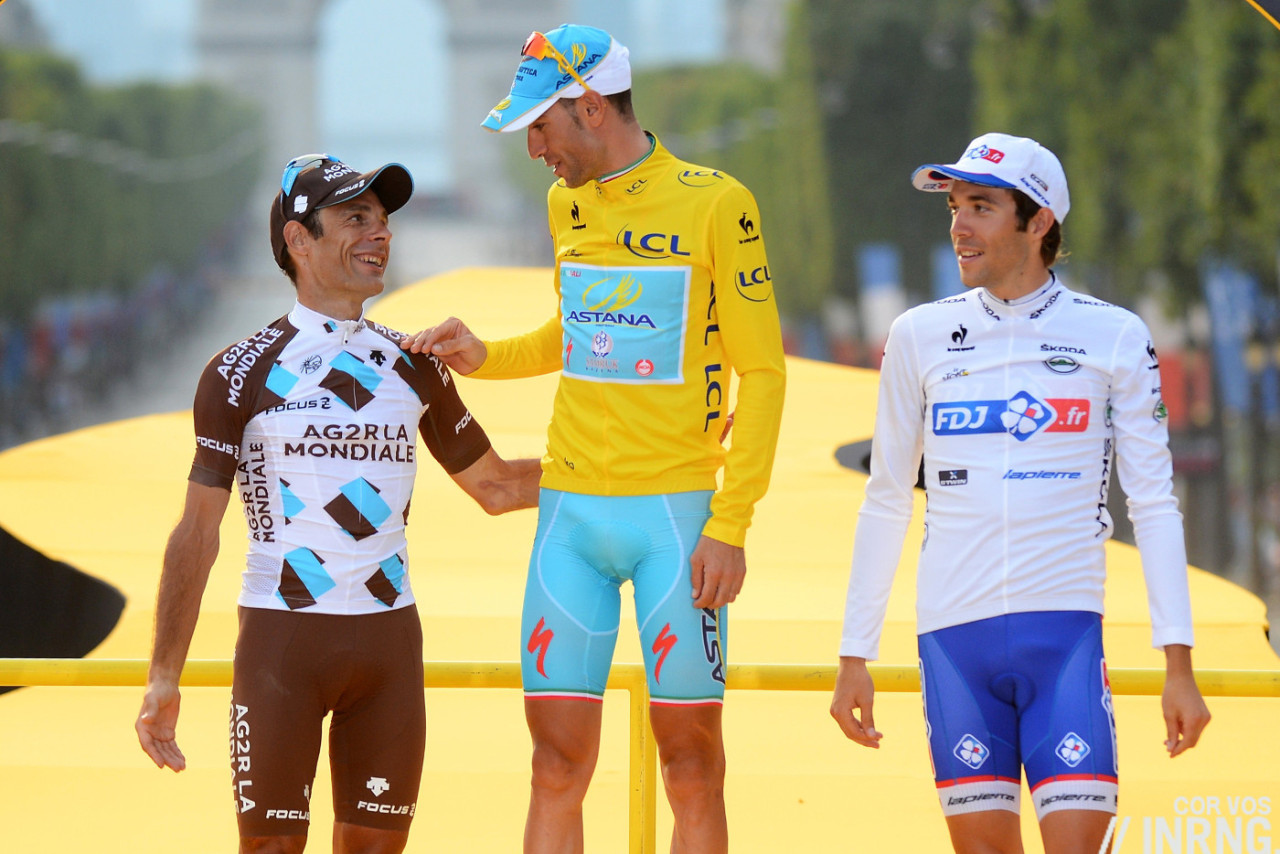
The Verdict
A fine edition with action from start to finish. Some of it was the wrong kind with crashes providing instant drama at the expense of more complex plotlines in the sprints and mountains although how the orphaned teams responded is a story in itself.
After La Planche des Belles Filles many were already asking if Vincenzo Nibali would win the Tour de France. Every new stage only brought more certainty and increase in his overall lead. But behind there was no such certainty and the story turned to who might accompany Nibali on the podium and this was uncertain until the very end. It was the daily stories that made the three weeks compelling, it passes the “DVD test” where you’d gladly sit down over the winter to watch the race highlights again, to see the battles replayed and remember the action.
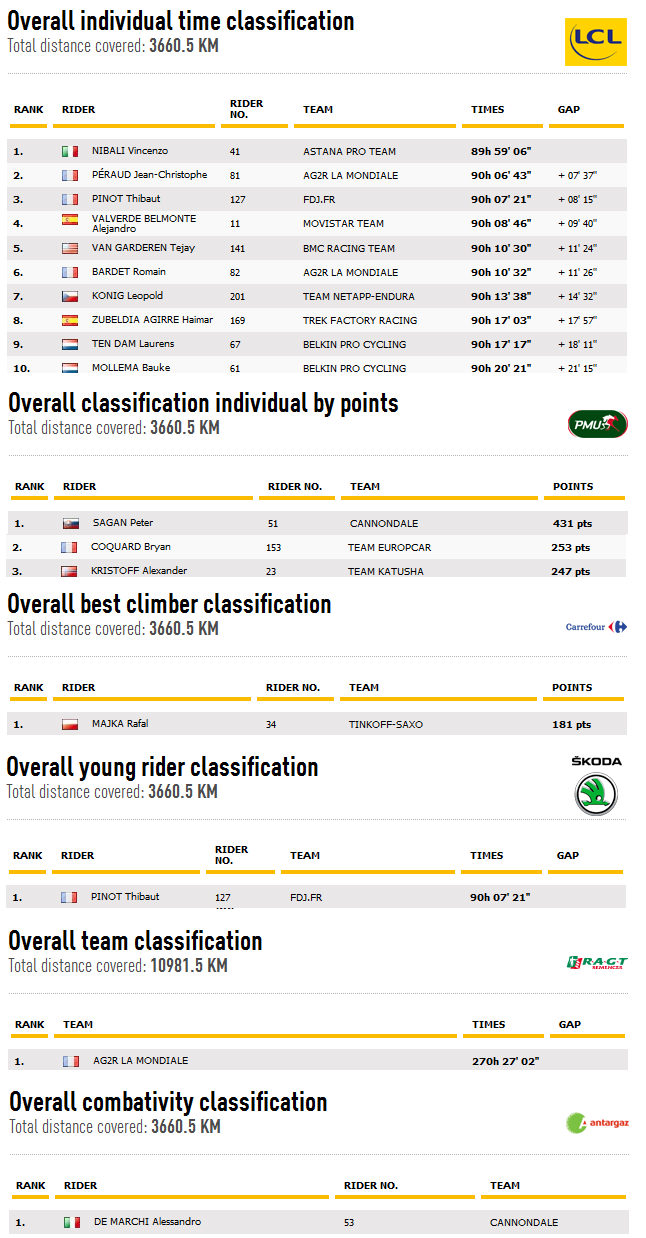

What has happened to Ag2r in the recent years. Is it a new management or is the work on french talents that has turned the team in to a Grand Tour superpower?
And of course: Thanks for all the great previews!
Ag2r’s management has improved, the finally hired a full time coach this year but it’s still imperfect, if riders on the team want a powermeter they must buy one with their own money for example. But they do place a big emphasis on teamwork and having two riders in Bardet and Péraud brought it all together… as did the changed circumstances for other teams.
One of the more remarkable aspects of AG2R’s Tour is that they achieved their performance without the supremely talented but erratic Betancur. This is not to say that Peraud wouldn’t have performed better than the Colombian, but these excellent results, plus the presence of Alexis Vuillermoz and Pozzovivo in their roster, will probably make them wonder if Betancur is worth the hassle.
On the ITV podcast today, Matt Rendell spoke to Vincent Lavenu about Betancur and whether he would be at AG2R next year, and Lavenu replied that he didn’t care.
Doesn’t sound too good for Betancur
Thank you so much. The commentary has enlightened and enhance my enjoyment of this Tour (and others too, I am a long-time lurker). The efforts you have made are much appreciated by many.
Trek Bikes, hmmmm….. look good, do they they do one in steel?
Missed my chance to say thank you on the stage profile but this is even better! Agreed, it was a fine edition.
Very good point, the one about the double-standards used at the “Dopage” section.
“…if the Italian is the Shark of Messina, Péraud was the “Remora of Lyon” – yep, that’s classic inrng!
I like the contrast of the analytical charts and phrases like this.
Very nice wrap up of the 101st Edition! Thoroughly enjoyed your perspective and analysis and humor about this Tour. You possess insight that I’ve not seen in other writers who blog about Pro Cycling, and that makes INRNG (you) highly valued by readers worldwide, as I’m sure most would agree. And yes, it is good that Nibali did not ride the climbs faster than Lance!. That speaks volumes and the sport needs clean like a rider after Stage 5!
That Nibali finished 2nd on the cobbles, only 19 secs behind Lars Boom was very impressive.
“When you started out, you dreamed of racing Paris-Roubaix.
When I was kid I was fascinated by the cobblestones. It’s fascinating to watch, especially in the bad weather conditions. But a race like that is really for a different kind of rider, a rider that is heavier, that can bounce along on stones. I’ve never even done it as a professional.” – Bicycling, January 2014
Good bike-handling skills thanks to his boyhood mountain bike riding!
Even though the cobbles came early in the race, it’s interesting to see where our podium finishers and GC contenders placed on that rainy, muddy day:
Stage 5 Results
NED 1 BOOM, Lars (BELKIN) 3:18:35
ITA 3 NIBALI, Vincenzo (ASTANA) + 19
FRA 24 PINOT, Thibaut (FDJ.fr) + 2.28
ESP 26 VALVERDE BELMONTE, Alejandro (MOVISTAR)
FRA 27 BARDET, Romain (AG2R LA MONDIALE)
USA 31 VAN GARDEREN, Tejay (BMC RACING)
FRA 46 PERAUD, Jean-Christophe (AG2R LA MONDIALE) + 3.46
Thanks INRNG! And now onto the final GT of the year…will Purito have his legs in a month? Will Froome’s injuries be healed enough? Will Contador ride? Will Valverde have enough fuel for Spain?
And old man Horner, can he defend his title? Should be a great race if all of these riders are there!
Vino also arranged for some private tutoring for Nibali on the cobbles by former P-R and Flanders winner, Peter van Petegem. “Leave no stone unturned” indeed 🙂
The Vuelta startlist should be heavily populated with contenders, don’t forget Quintana (and his younger brother, Dayer, who some say is even better) and Nibali’s countryman and Astana teammate, Fabio Aru.
Pinot is also talking about riding too. Talansky and Dan Martin are due to ride and we can add several more names.
Almost like the Vuelta is a repechage?
Ironic since last year there was a lot of discussion about shortening or eliminating the ‘third’ Grand Tour. Boring and unnecessary. World Championship training. This year the Vuelta may have a start list with the most star power, and a venue where they may all be racing to win.
Quintana, how could I forget him? (I don’t know much about his brother, but they say he’s better?!) For Quintana to win, he must have significant time on his rivals because there are two ITTs, one 34.5 kms and the 10 km. IMHO, I don’t think either TT suits Quintana’s strengths. The first one has roughly 9kms of climbing and the remainder is descending. This will suit the aero specialists and great descenders like Froome, Valverde and Purito, etc. *It’s not certain that Froome will ride, but Brailsford says that “…it is more likely than unlikely.” And Froome wants the Vuelta win on his palmares after pulling Wiggins up the climbs in 2011 to finish 2nd.
The 10km TT is basically flat. I remember the prologue in the Tour of Utah or the USA Challenge a couple of years ago — it was all climbing and somewhat steep — Quintana flew up that course and won it, I believe.
Aru is also a climbing specialist and TTs are not his strength, so he would also have to put good time into his rivals to finish on the podium.
Horner will be fighting hard (wonder if his legs will be refreshed?), we know that a healthy Froome can win, Valverde in his homeland and eager to avenge his Tour defeat and the same for Purito. Contador will not ride, not enough healing time for his tibial fracture. I’m really disappointed about his non-participation after crashing out of the Tour early.
If Pinot is there and Talansky is healthy + Dan Martin, what a great competition!
The ITTs are a big factor in the Vuelta. Bring it on!
Quintana has performed well on short, flat ITTs this year (Tirreno) so he might not lose too much time their. Of bigger concern for him will be his team dynamic with Valverde riding as well. Is the latter going to work for Quintana and maybe use the Vuelta as training for Worlds? Or is he going to try to make amends on his Tour performance and ride for himself if he has a shot at a podium or victory? Also, Dayer Quintana is talented, but he hasn’t had results that would suggest that he is better than Nairo
Chris, you make good points. Valverde’s likely frustrated and may want some instant gratification, thereby going for GC in the Vuelta; but if Quintana has better form, then Valverde will have no choice but to support his teammate. Then he will have ridden back-to-back Grand Tours with no podium chance for himself. The Worlds would then be his focus.
For such a little guy, Nairo Quintana sure has talent beyond being a climbing specialist. You can see the joy in his eyes as he gains distinction in the peloton and in the public eye. I see much gratitude when he’s onstage for anything. Coming out of Colombia as a natural climber, as the Colombians have always been, typically using their bikes purely for transportation at high altitudes; then the bike becomes a “ticket” to racing and having the opportunity to race in the states and elsewhere, they are no longer in the shadows of the GC contenders. They become GC contenders themselves and not to play a career role as a super-domestique. I’m very happy for them. In a perfect world, all nations would have these types of opportunities.
Horner’s one pacing up the last hill in a funny way resembled Nibali’s ditto in the Dauphine where he was outclassed, and virtually given up as a contender for the Tour. So if Horner walks in Nibali’s shoes, then the much younger riders in the Vuelta will have to keep him under surveyilliance. If he could do it last year, he just might one more time, especially if he is once Again not taken seriously.
Actually Nibali (Like Froome last year, but as so much) lost time to the others on the last stage 😉
Feels a bit like no one really wants to say it because we have a worthy champion & no doping headlines, but I think we’ll look back on this as one of the more drab tours we’ve had in some time.
As nice as the route was, Nibali held the yellow jersey for all but two days… and people were complaining it was a formality in 2012! The fact is, without Contador and Froome, it was a complete no contest. The green jersey too was wrapped up by about Stage 6 and while there were a few nice moments in the memory, it sadly wasn’t anything close to being a classic.
Certainly no classic nor the battle we expected before the start. But still watchable because of that, there was no controlled racing but instead a variety of outcomes each day. That said if I enjoyed it, no reason for everyone to do so too.
Completely agree. There’s an element of “what might have been” if Contador and Froome had stayed upright, especially given how strong Tinkoff-Saxo’s team looked: the numbers seem to show that Nibali was as fast uphill this year as Froome was last year on all but the longest climbs, we saw Contador have a *slight* edge on him in the Vosges, and we knew that Froome could hold off Contador (when fit) from the Dauphine. Add those to Nibali’s lead from the cobbles and it could have been one for the ages. But as it was, the race *behind* Nibali was excellent. Roll on next year.
(Also, for all the criticism of Froome staring at his stem, you can see Nibali have a good old look down at his power meter just before each of his key attacks.)
From moaning about power meters in races during last year’s T-A, Nibz has certainly embraced them himself 🙂
I disagree. The Tour is ALWAYS interesting, each year for different reasons. I celebrate the Tour each year (now 40 or so and counting) because the stories are always compelling. It’s not all about the leader. It’s also about breakaways and sprints and crashes and heat and courage. I think this was another GREAT Tour.
What I’m sensing is (possibly) that our age, how long we’ve followed the Tour, our life’s experiences and what we value all play into how much we will have enjoyed each Tour at its completion. Again, this is speculation based on my own experiences, age, etc. I agree with Davido that the Tour is always interesting. I’ve followed it since 1980 (34 years). The stories aside from the race itself, the culture of a town the peloton passes through, the history of a road rarely ridden, the exquisite scenery and contrast of architecture. I live in the US, have never been to Europe, and am in awe of the old architecture that I see all over Europe. America is new (comparatively) and our architecture is more modern and some lacking character, IMHO. That’s not to say that we don’t have beautiful architecture, surely we do. And scenery – the US has scenery that is so beautiful that one can spend his life just traveling in our 50 states and never be bored. I’ve been in 25 of them and wow, gorgeous!
I like hearing about where a rider has come from, not just his birthplace, but how he “climbed” to reach ProTour status, his personal challenges, financial challenges, national challenges, etc.
It’s not just about the yellow jersey for me, but who are the other “characters” that add to the whole experience. Many are over 35 and 40 – some we know, some we barely ever hear about. Haimar Zubeldia comes to mind, 37 and many Top 10 finishes, but not a GT winner or GC contender, but he’s put his all into servicing teammates mostly. That’s a lot of work that he’s put in over many years and he deserves recognition for that. Many of these guys fade off into retirement. I wonder how they feel after a long career as a domestique?
The crashes, yes! I want to know all I can about the crashes because they have such a huge effect on the results of the day or an entire race. If a rider leaves with injuries, I want to know what their injuries are, even if they aren’t a contender. (SportsMed career, so love the blood and gore details)
It is already an enormous undertaking to ride in a GT, but add the other elements and they make the day(s) that much more challenging. Rain, mud, cobbles, heat, cold, humidity, fog, wind, etc. We watch and we see (or don’t see) these added elements and we may not think much about them, but it takes toughness, courage, experience, luck, heart and soul to finish a stage sometimes, or to win a stage for the first time ever!
I think about all of this as I watch and my hat goes off to all who participate. Yes, like Davido said,
“…this was another GREAT Tour.”
DRAB?!? Wow, did we watch different races. The one I watched was the exact opposite of drab.
I agree, J-rod could have gotten Podium i think, but oh well
If he hadn’t crashed so badly out of the Giro he’d have gone very close there but it wasn’t to be for him. Vuelta if he gets his legs back properly?
I think he was actualy trying to lose time early to be let away for stages more easily as he said he didnt want to go for GC
Jakob Fuglsang deserves a lot of credit for helping Nibali during that first week, particularly Stage 5.
True, invaluable on Stage 5. But he fell away later, stomach problems in the Vosges and then the crash in the first day in the Alps. Without this – speculation, of course – a top-10 is possible.
Well, technically Nibali didn’t wear the yellow jersey on 3 stages, 1st, 2nd and 10th 🙂
I think this tour was very exciting in the individual stages, but not for the overall. The route certainly helped in making those stages interesting to watch. The solo wins by Martin, Gallopin, Rogers, Navardauskas were great to watch, and there was some interesting sprinting too, lots of drama on the mountain finishes. I like the single long TT at the end. It is a great test of three-week endurance and it adds suspense.
Nibali was impressive in the way he outrode his rivals everywhere, from cobbles to climbs to TT, but a fight for yellow would have been better to watch. Not his fault, that’s clear. I hope he returns with similar form next year, and gets more competition nonetheless.
And last but not least, thanks INRNG for all the insights, and many of the commenters too. Bring on the Vuelta, the worlds, Lombardia.
Inner —
Great tour coverage — the blog was great to read over the three weeks. I thought the above analysis was dead on.
However, in your discussion of Astana and its dodgy past, you mention Mardiot and Vaughters as being on the side of the good guys. Yet, Riis isn’t mentioned. Why? He publicly admitted to doping and apologized long before JV did.
And don’t forget Matt White, who served a suspension…..but you don’t have to mention them all. And they are just the KNOWN ones.
I think its time to move on – Vino, Riis and the rest are here to stay.
Because I wanted to cite two examples of teams with excellent reputations. Riis tends to fall in the camp of those people some feel uncomfortable about already. The point isn’t to personalise it, more to illustrate how messy the past was where even “the good guys” were making bad decisions.
Vaughters quit early as a rider because of doping. As a manager, he seems to have tried (more than most at least) to change things.
Riis on the other hand definitely doped as a rider, was unrepentant about it for many a year, and there are allegations against him when he was a manager that he *helped* and encouraged riders to dope under him.
So, both doped themselves, sure, but one of them has made a strong effort as a manager to eliminate the need for new riders to dope, while the other….
Yeah yeah, and the right way was hiring lots of “I-didn’t-want-to-dope” like him who didn’t speak about it (nor showed any repetance) until they were forced to.
Suddendly, they all remembered how horrible was it to dope, and, hey!, they all usually stopped doing it some 8 years before.
Weren’t there young & clean riders to hire? No, it was the Big Secret Conversion Project, let’s clean our bodies and souls together…
People who “quit early because of doping” often don’t get top level, and, so many times, they quit BEFORE having to dope.
Sorry for my tone, it’s not intended to be harsh against Vaughters and Garmin, I respect them (more or less I respect Riis), and I believe that anyone tries to survive the way he can in a very difficult world as pro cycling.
But, please, the PR fairy tale sold as “facts” is too much for me.
Thank you INRNG for the superb coverage of the Tour. Your blog has been a daily must read and this wrap is chock full of insight and analysis – you really have informed me and improved my enjoyment of the race this year.
Haimar Zubeldia… most invisible rider to have 5 top 10 TdF finishes in recent memory.
Who?
I’ve asked before if we’d recognise him if he walked past on the street. It shows the importance of “Moto 1 /2”, the first two TV cameras show the breakaway and the yellow jersey group but often from the front. What happens at the back of the yellow jersey group or the next group behind this is often invisible despite a lot of impressive riding.
actually i personally think. live tv is not really the right medium to cover a bike race, its good but has its flaws. maybe the internet era will in the near future bring us a new way of medial coverage to tell the story of a race?
Haimar Zubeldia does not exist.
I think even JVDB was seen more often!
The Vuelta promises once again to be the most interesting grand tour of the year with regards to the GC competition. And that’s only partly due to the illustrious field that will probably attend.
The course as it has been during at least the last two editions shows a very different approach than the TdF. There have been so many stages where anything can happen in the GC that you can’t come up with a game plan where you have to concentrate on certain stages and let your team defend your position on the other days. Just ask Nibali who lost the race last year against a much older but much fresher man who also came with a considerably weaker team than Nibali’s Astana.
Here’s hope we’ll see a really epic GC battle then and benefit again from the great insight and knowledge of our highly regarded blogger.
Thank you, INRNG!
The Vuelta promises to be good, maybe great, but how many of the names we’re thinking of will show up but not be 100%. Thibaut Pinot is due to ride but I wouldn’t blame him if he spends August relaxing; Alejandro Valverde needs a rest too and might feel bored by the idea of riding for Quintana. The late season is always a strange time of year, some riders are desperate for a result but others are feeling bored and just want a break and to start making plans for 2015.
So, let’s count those who will certainly not be affected by the late season lull. I reckon with Horner (maybe supported by Costa preparing for the Worlds), Purito who was obviously training at the TdF for bigger aims (probably supported by Moreno), Quintana (maybe even two of them). So that makes three riders of similar abilities all very much made for this kind of extremely mountainous race. Add those candidates who might or might not show up in great form but who certainly have a reason to do so: Froome, Valverde, Daniel Martin, …
If only Horner, Purito and Quintana live up to our eligible expectations and don’t crash out we are up for a great race.
I really enjoyed this Tour, yes the race for Yellow and Green was done and dusted pretty much early on in the piece but seeing some breakthrough results for the young french riders has been good. Frank Schlek looked like he might be on the right line from a comeback point of view as well.
OGE didnt really do to much, the crash with Gerro and Cav ruined what hopes they had for Stage 2 and you wonder what might have been if Matthews hadnt got injured before the race. Great result by Garmin on the 2nd to last stage as well. great tactics.
Cheng Ji top results:
stage 13th Tour Of South China Sea (’08)
164thGC Tour de France (’14)
175thGC Vuelta a Espana (’12)
NOT NORMAL
What is your point?
Why is it implausible for a domestique tasked with closing gaps to finish low on the GC?
I think this edition of the Tour was a reminder that it’s sometimes best viewed as a succession of individual races, rather than a single race to determine the GC. As ever, if competitions seemed wrapped up early (GC, Green) then the solution was to start looking for the smaller stories and the usual enthralling competitions lower down the order – and this tour provided plenty of subtext. Thanks, Inrng, for drawing out some of these smaller issues along the way, and also for engaging with your audience below the line, whether for clarification, contrasting viewpoints, or simply to turn a monologue into a dialogue. And finally, thanks to those adding their voices – the interesting thing about blogs, rather than straight reportage, is that it can become a conversation between interested parties instead of simply a record of what has been and an empty claim of authority. This can only happen if – as here – people are polite, prepared to listen to alternative viewpoints, and prepared to chip in with their own ideas.
Chapeau all.
+ 1!
Thank you INRG – my go-to resource for facts to learn more about cycling and impress my cycling friends with 🙂
Thanks Inner Ring, my go to gear on the inter webs!
who would you then name the losers of the race? i mean its a great achievement to complete the race, but i guess some expected more of it. Sky of course? the spaniards? (contador crashed, purito lost the mountains jersey, valverde his podium seat) . the belkin boys with their horrible TT-performances, the american prodigys failed to improve (their placings of former tours), the british won nothing at all(first time in years)…
There are no losers. There are only competitors, some finish, some don’t. Some have good luck, some have bad luck and some things are just the way it is.
But to judge Team SKY, “the spaniards…contador crashed, purito lost…valverde…the belkin boys with their horrible TT-performances, the american prodigys failed to improve (their placings of former tours), the british won nothing at all…”
Wow. So, if a rider crashes out like Contador, Froome and Talansky with significant injuries, they are losers? You come to race, you give your all, you do your best and a crash that possibly wasn’t your fault sends you home. These guys are human and as such they will not perform at 100% all the time. Is everyday 100% in your life, whether it’s bike racing or in your occupation?
Andrew Talansky was in 8th place on GC after Stage 7, + 2:05. His crashes and significant injuries
were unfortunate and I have no doubt that he will finish high on GC next year. Watch for him in the Vuelta, he’s a great young talent. Tejay VG had a Tour some only dream of. His 5th place means less than his accomplishments/improvements along the way. Tejay had a great Tour, period!
Cav caused the crash that took him out, but he was under tremendous pressure in his hometown to win the stage in front of his mum, family and friends. He apologized for causing the crash and we lost a fantastic sprinter who would have given Kittel even more competition. Froome crashed and had fractures in his wrist and opposite hand – he couldn’t even hold the handlebars his pain was so great. Given the picture for the Brits, winning “nothing at all” is quite a harsh statement.
“When you judge others, you do not define them, you define yourself” ― Earl Nightingale
i did not mean it as an insult or degradation, maybe loser is the wrong word. english is not my native language so i may misjudged the exact meaning of the english term. maybe not reaching their goal is a more appropriate term? im also one to celebrate the contenders of the tour as splendid athletes. and dont want to degrade this people.
but sport is brutal sometimes. you can read the resluts in numbers up to fractions of a second. and its well possible that even a cheater or unfair person (just theoretically saying) is on top in the end, so is the opposite. fairness not necessarily included in that process.
And its only always talked about the winners, but the tour has its share of people who do not reach their intended goals too. Maybe with great consequences for their careers? for whatever reason it may be. their own fault or not.
Im not judging them as people or want to make fun of them.
Just resonate about the results of a great tour.
so how you say, no offense intended, i just wanted to start a discussion about a new topic.
p.s.
yeah i had my fair share of disappointments too, some with more some with less consequences, so i know they belong to life.
Notwithstanding the discussion above, and to go (respectfully) with what I believe the original intent of the question, then I might suggest the following:
– OGE. Badly affected by the Cav stack in Stage 1 (Gerrans)and unable to salvage anything of great note with plans B and C (unlike OPQ or TSB). Pains me to say it as an Aussie, but a disappointing result for a team that perhaps punched above their weight in the last edition.
– Cofidis. Were they even in the race? At least Bretagne Seche and Netapp animated the race (and got a top10 on GC ).
– to a lesser extent, Europecar, with no stage wins nor maillot a pois. At least they were highly
visible.
As others have alluded to, I think the absence of Contador and Cavendish (and less clearly, Froome) freed up their respective teammates to go well individually (Majka, Dodger, der Panzerwagon) which may well have been to the detriment of the likes of Cofidis.
Neta
Oops.
Netapp should indeed be proud, excellent work by Konig.
Re Sky – I wonder how much they care, once Froome had gone and Porte cracked? I would like to see inside the mind – is it all about winning the Tour, or do they really want stage win consolations (and how much do they want classics success – is the relative lack of results due to road racing naivety or different focus).
well OGE had a really great run at the giro and anyway a good first half of the season. so i guess they get over it.
IAM were also visible, but couldnt get any real result in the end. well frank crashed out maybe he could have had a good placing. in shorter stage races he was on the level of könig, but who knows. and chavanel and elmiger got chaught, haussler had faster sprinters finish before him. a win would have been nice. but well first time and non WT-Team.
Right Knider: No offense taken. Your English is very good for a non-native speaker/writer.
Yes, many riders in the peloton do not meet their goals, and in their own minds, likely a good percentage of them, label themselves losers. Winning is always the goal and each does his best and that is all he can do. Factors such as whacko fans with cameras, crashes caused by others, weather, mechanicals are variables that they have no control over. So to finish any race has a certain amount of luck involved, too.
To be a competitor is to crave winning as the only outcome. You must be willing to give into pain or tune out (dissociate) from it. That’s the only way to win. I used to race Giant Slalom in Alpine skiing. One race day during a blizzard, the course had much ice under the new snow. As I was giving it my all to hold my ski edges on that ice, my quadriceps were burning like never before, pain like never before, but I wanted to win the race. I gritted my teeth the whole way down and thought my thighs would explode from burning pain. No, but I won the race.
So, I guess my point is that each athlete will likely label himself a loser if he doesn’t win (my opinion). He is judging himself and we all do that. I don’t judge others, or at least try not to.
To be at the highest level of competition in any sport, and be paid for it, it’s your duty to win for your sponsor, etc. You’re being paid to be the best.
Velo de Montagne: I think you’re being quite unfair on Right Knider.
This is professional sport – there ARE winners and losers – that’s how the game is played. Even if they do give more than 100% (and no-one doubts that) they can still lose. And they do lose.
They admit it themselves – take for example Sagan’s statements that he lost the stage 7 by such a tiny margin. He sees it as a loss (witness how he angrily threw away the Maillot Vert flowers after the presentation) so I don’t really agree with your critique.
Right Knider is correct – in the Tour, the Brits won nothing. That’s undeniable. He didn’t say that its a poor acheievement to be riding the Tour, or that they should have done things differently, or better, or that they didn’t try hard enough – he simply stated the obvious that Sky came out of the event with nothing (save for Nieve’s combativty prize). Yes, Froome had terrible injuries, and yes he’s a hero for trying to continue as long as he did, and yes Porte tried a heroic break on the Champs Elysees yesterday – but that doesn’t reduce the fact that Sky came out of the Tour with nothing. So its not a harsh statement at all from Right Knider.
You say that these guys don’t perform at 100% all the time – whcih is of course true. But in a competitive sporting environment, that often results in a loss. How could it be otherwise?
I have to admit that I don’t understand why you say added the Nightingale quote at the end. Are you saying that one should only judge a world-beating professional sportsman by the same standards that one judges oneself? Seems as if you have quite a different perspective from the majority of readers of this blog. Are/were you a world-class athlete? If so, that’s far far beyond most of us.
Its not fair to critique someone for reasons that don’t stand up to scrutiny.
I fully agree with Velo de Montagne. Already Right Knider’s request to cite the losers of this TdF reveals a thinking that I disgust. Is it necessary to have raced yourself in order to be able to understand that bike racing is not about losing but about reaching invidual targets? When some 200 riders compete and only one can win do you then have 199 losers after the race?
If you reply no then where is the threshold in terms of results, placings above which you still qualify for being called a winner albeit you did not stand on top of the podium?
Is Haimar Zubeldia a loser because he only managed 8th place and did not win a single stage? For me he is not, since he certainly did not aim to win the GC and most probably did not even aim for a stage win. But he most probably lived up to his and his team’s expectations.
We as spectators should definitely stay away from judgements about who is a loser. Leave it up to the athletes to decide and publicly admit whether they have reached their targets in a race or not and therefore consider themselves having lost or not.
And yes, the Nightingale quote albeit I have not known it so far is a very fitting remark. For it definitely says more about you if you ask who has to be considered a loser than any resulting division in losers and winners will tell about the performances of those athletes.
STS:
If you read Right Knider’s first post carefully, and then his detailed response to Velo de Montagne, he was very careful NOT to say that there are 199 losers in every race and only 1 winner.
He clarified his category of “losers” to be those teams, nations and riders that had big expectations and objectives but failed to acheive them: Sky, the Spaniards on the podium, the Brits anywhere, the young Americans exceeding previous years’ placings, the Belkin riders’ TT performances not being what one would expect, etc.
He specifically said “the tour has its share of people who do not reach their intended goals.” In other words, he was actually talking about the same individual targets that you mention when you say that “bike racing is not about losing but about reaching invidual targets”.
You say that it should be up to the individual athlete/team to make public statements about their objectives and whether these have been achieved: that too was Right Knider’s point: his list was (obviously) taken from the public perception of the objectives of teams/riders. And where does that public perception come from? Public statements from the teams.
Its unfair to criticise someone without fully understanding what they have said.
_tongue in cheek_
Jack Bauer – so very close!
The car driver who got disqualified – didn’t actually hit anyone, they need to watch the Flecha/Hoogerland video and do it properly next time.
Specialized – a lot of people think Contador’s bike broke, even though it didn’t.
Sagan – he always looked so sad in interviews after coming top-5 in a a stage, despite winning Green by a mile.
David Millar – missed the farewell Tour, but now can’t even complain too much after Navardauskas got a stage win.
And a thousand other lovely stories that keep us entertained far beyond the race for yellow…
Jack Bauer was a winner even though he didn’t cross the line first. Heartbreaking.
One loser had to be the girl whose phone was knocked out of her hand by Nibali! She made it on TV alright, but as a laughing stock.
Very interesting and entertaining race, despite, and I think almost because of the crashes.
I hope a speedy recovery to all the fallen riders, but I think it actually made the race very exciting once Contador, Cav, Talansky and Froome had crashed out. In order to salvage their race OPQS, Tinkoff-Saxo, Garmin and Sky all dedicated powerful riders to breaks and counter attacks, which livened the race I think. Think Martin’s first stage win and Majka’s hunt for the poka dots. These are often riders who are hidden riding in service of the team leaders…
The freedom they had hurt Europcar, Cofidis and Lampre-Merida though…
Thanks for all your posts, analysis, insights, I look forward to the rest of the season!
Now that Nibali has done his Astana team a favour perhaps tegu could return one and give him a proper Italian national champions jersey rather than the Hungarian abomination he has now.
Fantastic race and a great one foe the host nation. Well done Nibali, to finish first, first you must finish. Nobody mentioned it yet but I really, really enjoyed Lemond on Tour insightful, fun and entertaining. Great to see Greg back on the scene.
I didn’t watch Eurosport in English with LeMond but from all accounts he was enjoying being back. I did see him reunited with Hinault the two seemed to get on very well.
I’m not a born English or French speaker, but it sounds me odd how Lemond is hesitating as speaking English and how fluent as speaking French.
leonn: I also noticed Lemond not speaking smoothly at times. Maybe because he hasn’t been a commentator as long as Phil Liggett he’s lacking confidence at times? His deep passion and knowledge of the sport is there and sometimes it’s hard to get your words out smoothly when you’re so excited to be talking about the very thing you know best.
Greg Lemond was always my hero, long before some guy named Lance came along.
Yes, and more than LeMond’s expertise, it’s his personality and his genuine love of cycling that comes through that makes it so enjoyable to watch him.
Loved seeing LeMond back where he belongs but the analysis and production of the after race coverage was patchy at best. The interview with Jens Voight after the final stage was woeful.
In terms of how bad it was for SKY what does it say about their performance when G finished ahead of Porte in spite of sacrificing himself repeatedly for him? I presume that a domestique doesn’t often finish ahead of the man he has paced to the finish.
Porte was ill so he fell back on some days and lost a lot of time. As much as Thomas is a domestique, he’s a luxury one and could even be team leader on another team in the race… if he wanted it.
didnt he win the tour of bavaria this year.
“If he wanted it” He seems more level headed than Wiggo (not knocking Wiggo but that’s how it is) but the Road v Track issue is always going to be there with G as well. I hope he gets the chance to lead the team in some of the big races in the coming years.
“Best team mate: Arnold Jeannesson, FDJ”
I missed something: why?
BTW, I read this blog about every Tour’s stage before of something else and it was amazingly delightful. Definitely this blog enriches Tour’s experience.
Congratulations INRNG for good work!
He did strong work leading out for Pinot in the mountains.
Yes, he has a big part in Pinots 3. place, really impressive on a couple of days. He’d be my choice too for this category
That’s why he was my pick. The team went in with a big squad around sprinter Démare and Jeannesson was the only climber for Pinot although Roy was helping too, especially after overcoming an illness earlier in the race. Jeannesson’s not an exclusive pick, several others were of course doing a big job too.
Great Blog. I do have one question that I have been wondering about since the first stage. I may be seeing something that isn’t there, but when Cavendish and Gerrans got tangled up in the sprint, they stayed upright until Coquard (sp) came by and gave Gerrnas an elbow, then both went down. I have never been in that situation before, but what are the chances they stay upright if Coquard stays clear?
Maybe but that’s the trouble with the sprint, constant movement in all directions. I’m not sure if Coquard’s elbow was deliberate though or just a balancing act?
Thanks IR, and all the usual suspects.
Rest up for Velta… we don’t want anyone off the back.
The biggest winner was Cheng Ji. This years Lantern Rouge. His selection to the Tour team was controversial within his team. But, by the end of the Tour some in the media were calling him the ‘Break killer”. Because he spent most of the day on the front of the bike race on the flatter stages.
He was also the first TdF starter and finisher from China. What a great accomplishment for him !
Firstly thanks as always you you for the fantastic insightful coverage. For me I hugely enjoyed this tour, not least perhaps because I was able to watch the first three stages as it all kicked off where I live, something I’ll never forget. However I also think the route and particularly the lack of a time trial until late in the race meant that riders looked to attack from the start and try to take time when they could early in the race (Stage 2 and 5) which put pressure on others and shook up the race. The first week is often a dull procession towards the mountains and then the big teams trying to strangle the race through pacing up the climbs, this edition saw none of this with a great first week and no team really able to control the climbs. Each stage had lots of unpredictability with attacking riding and some fantastic individual performances. Great stuff all round.
Surely Stefano Bernabino should get an honorary mention for his calamitous taste in trousers and his *expert* anchoring on Eurosport’s daily coverage “together with Greg Lemond”!
Some references to the Dauphiné lead me to recall a reader’s comments in a previous blog entry, answering to the fact that historically it was hard to shine in both race, or, better said, that if you were shining in the Dauphiné maybe you got too early to your top form. So the best was, typically, to be slightly underperforming in the “preparation” races (TdS, too). Sky’s approach was sort of “peculiar” from this point of view.
Weel, that reader attributed everything to “old school blood transfusions”. IMHO, it obviously made no sense, but, ok, let’s see this year’s results.
We can’t say much about Contador or Talansky, but third placed Van den Broeck had one of his worst performances ever at the Tour, quite like his… debut Tour! Bardet more or less confirmed his results (even if he looked better in the Dauphiné whereas he appeared a bit more worn out in the Pyrenees). Nieve and Navarro had a top ten that’s quite good for them, but failed to perform at their best level at the Tour. Just outside of the top ten, we find a bunch of riders who went on with growing form to the Tour, be they captains or domestiques, notably König, Van Garderen, Gadret and Kangert.
35th placed Peraud is in fact kind of strange, maybe he was the one storing blood X-) (just kidding, don’t sue me, please!).
In Switzerland, both Rui Costa and Mollema were on the podium, but their Tour… :-S
Only Martin and Dumoulin confirmed good performances in both races, but racing for stages or for GC (whether as a captain or a domestique) is way different.
Let’s look just outside of the top ten, to find some riders who didn’t a have disaster of a race (you must have some form, anyway, approaching the Tour), but maybe were slightly underperforming, let’s say… the way Nibali was riding in the Dauphiné.
Hello Thibaut Pinot… 15th placed! Hello 13th placed Ten Dam, who went on to get his best ever result in the Tour! Hello 19th placed Jeannesson, “best domestique” in the Tour according to inrng (and not just him/her)!
Soooo… okay, I got it, they were all storing away their blood, while just Contador and Froome weren’t 😀
sending westra in the ST5 break, then calling him back to pull nibali and fuglsang back up after iglinskiy and gruzdev were done –
that put a gap on contador and changed the spaniard’s whole outlook
when it came to the mountains alberto knew he needed a psychological blow early in order to begin to claw back tiny bites each day
he attacked in a frenzy on st10, looked away from the road and hit a rock – game over
westra dropping out of the break – in hindsight – was the moment the race was won –